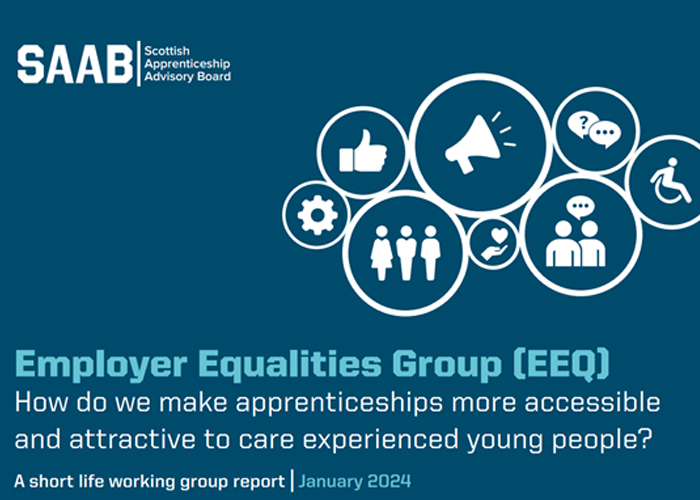SYSTEMIC change is needed to spending on benefits, housing and wages to ensure care experienced young people can access Scottish Apprenticeship opportunities.
A report published today (23 January) from the Scottish Apprenticeship Advisory Board’s (SAAB) Employer Equalities Group (EEQ) offers four recommendations to the Scottish Government for systemic change to raise the numbers of care experienced young people getting into and achieving apprenticeships.
Tony Scally is National Lead for Employability Service Development at Action for Children, a member of the EEQ, and Chair of the short-life working group who researched and wrote the report.
He said: “Apprenticeships are an attractive option for young people with care experience, offering a wage while gaining qualifications. But the current support landscape is cluttered, over-complicated and bureaucratic. It means young people are stuck in a system that instead of helping them on, actively holds them back.
“Our recommendations offer a clear way forward for the Scottish Government to improve not only apprenticeship uptake for care experienced young people, but retention and completion levels too.”
The report puts forward 4 recommendations to the Scottish Government for systemic change. These are to:
- Expand the Care Experienced Students Bursary in Scotland to care experienced young people undertaking an apprenticeship.
- Lobby the UK government to adjust apprenticeship wages for care experienced individuals.
- Call for changes to Department for Work & Pensions policy to offer greater support for care experienced young people starting work particularly those living in supported accommodation.
- Bend the spend – take action to prevent incurring costs in the future, by putting in place measures to spend public finances more efficiently, saving the public purse in the long term.
The report also lays out a series of shorter-term actions that can be taken by employers, SAAB, local authorities and the national skills agency to begin improvements while systemic change is ongoing.
Included in actions for employers is to embed more flexible recruitment practices, and to partner up with national providers to offer crucial, out of work, mentoring support.
A commitment to driving inclusion and equality in the workplace has been a priority for Diageo, and this has included the work the global spirits and beers producer does to build its apprenticeship programme. It’s employability programmes Learning for Life and Career Ready also offer mentoring from employees to support young people from disadvantaged backgrounds to help them with the transition from education into the workplace.
Gillian Dalziel, CSR Programme Manager – Learning for Life, said: “Our target for Learning for Life this year, is to support 1100 people across the UK from disadvantaged backgrounds into sustainable employment in our hospitality industry with a focus on half being female.
“At Diageo we are committed to creating the most inclusive and diverse culture we can, as well as shaping market-leading policies and practices because it is both the right thing to do and helps our business to grow. This is core to our purpose of ‘celebrating life every day, everywhere’.”
The national skills agency Skills Development Scotland, which administers Scottish Apprenticeships on behalf of Scottish Government, is being asked to report on support for care experienced Modern and Graduate Apprentices via contracts, as well as to seek additional funding to cover expenses associated with starting work, such as work wear or tools.
Head of Equality and Diversity at Skills Development Scotland, Fergus McMillan said: “As a corporate parent, SDS welcomes this report and its recommendations. We want to be confident that we are doing everything possible to ensure that care experienced young people are able to benefit from entering and succeeding in apprenticeships in the same way as their wider peer group.
“We are pro-actively considering the recommendations and in particular the role that mentoring plays in supporting young people to enter and sustain an apprenticeship.”
Among actions for local authorities is a call to offer continued, supported accommodation for apprentices based on income rather than employment status as well as to improve communication, including offering a named person for employers and young people to contact.
SAAB or any new employer board has also been given a series of actions, including building an evidence case for an increase in the minimum wage for apprentices, to research the positive impact of mentoring and work with local and national government to make the systemic change needed.
Tony added: “What is laid out in this report is a way forward, an opportunity, to make lasting, significant change to the lives of care experienced young people across Scotland.
“We can’t keep piling responsibility onto employers and asking them to find new ways to help. A new approach should see governments provide the financial support and guidance which make it happen.
“Working together to make these changes will benefit not only to young people, but business and the economy as a whole.”


